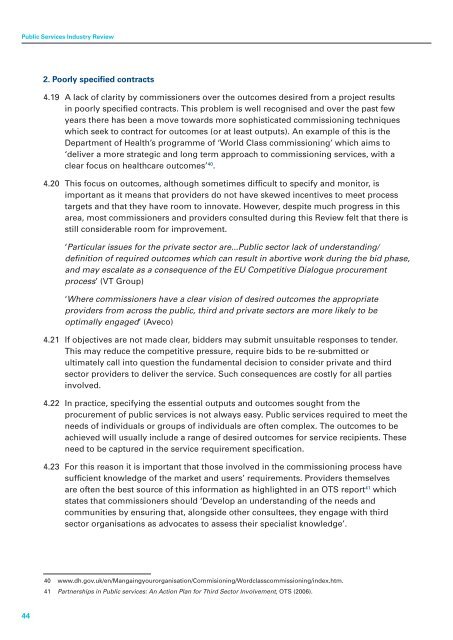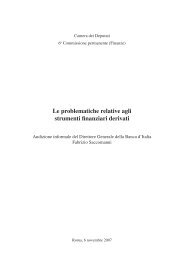Understanding the Public Services Industy
Understanding the Public Services Industy
Understanding the Public Services Industy
You also want an ePaper? Increase the reach of your titles
YUMPU automatically turns print PDFs into web optimized ePapers that Google loves.
<strong>Public</strong> <strong>Services</strong> Industry Review<br />
2. Poorly specified contracts<br />
4.19 A lack of clarity by commissioners over <strong>the</strong> outcomes desired from a project results<br />
in poorly specified contracts. This problem is well recognised and over <strong>the</strong> past few<br />
years <strong>the</strong>re has been a move towards more sophisticated commissioning techniques<br />
which seek to contract for outcomes (or at least outputs). An example of this is <strong>the</strong><br />
Department of Health’s programme of ‘World Class commissioning’ which aims to<br />
‘deliver a more strategic and long term approach to commissioning services, with a<br />
clear focus on healthcare outcomes’ 40 .<br />
4.20 This focus on outcomes, although sometimes difficult to specify and monitor, is<br />
important as it means that providers do not have skewed incentives to meet process<br />
targets and that <strong>the</strong>y have room to innovate. However, despite much progress in this<br />
area, most commissioners and providers consulted during this Review felt that <strong>the</strong>re is<br />
still considerable room for improvement.<br />
‘Particular issues for <strong>the</strong> private sector are...<strong>Public</strong> sector lack of understanding/<br />
definition of required outcomes which can result in abortive work during <strong>the</strong> bid phase,<br />
and may escalate as a consequence of <strong>the</strong> EU Competitive Dialogue procurement<br />
process’ (VT Group)<br />
‘Where commissioners have a clear vision of desired outcomes <strong>the</strong> appropriate<br />
providers from across <strong>the</strong> public, third and private sectors are more likely to be<br />
optimally engaged’ (Aveco)<br />
4.21 If objectives are not made clear, bidders may submit unsuitable responses to tender.<br />
This may reduce <strong>the</strong> competitive pressure, require bids to be re-submitted or<br />
ultimately call into question <strong>the</strong> fundamental decision to consider private and third<br />
sector providers to deliver <strong>the</strong> service. Such consequences are costly for all parties<br />
involved.<br />
4.22 In practice, specifying <strong>the</strong> essential outputs and outcomes sought from <strong>the</strong><br />
procurement of public services is not always easy. <strong>Public</strong> services required to meet <strong>the</strong><br />
needs of individuals or groups of individuals are often complex. The outcomes to be<br />
achieved will usually include a range of desired outcomes for service recipients. These<br />
need to be captured in <strong>the</strong> service requirement specification.<br />
4.23 For this reason it is important that those involved in <strong>the</strong> commissioning process have<br />
sufficient knowledge of <strong>the</strong> market and users’ requirements. Providers <strong>the</strong>mselves<br />
are often <strong>the</strong> best source of this information as highlighted in an OTS report 41 which<br />
states that commissioners should ‘Develop an understanding of <strong>the</strong> needs and<br />
communities by ensuring that, alongside o<strong>the</strong>r consultees, <strong>the</strong>y engage with third<br />
sector organisations as advocates to assess <strong>the</strong>ir specialist knowledge’.<br />
40 www.dh.gov.uk/en/Mangaingyourorganisation/Commisioning/Wordclasscommissioning/index.htm.<br />
41 Partnerships in <strong>Public</strong> services: An Action Plan for Third Sector Involvement, OTS (2006).<br />
44
















